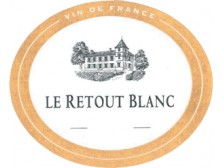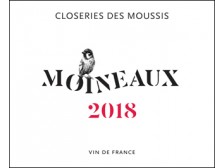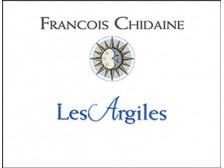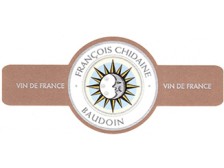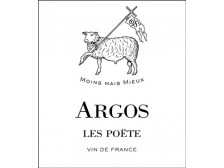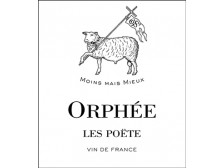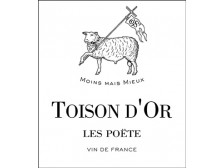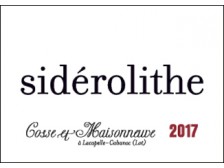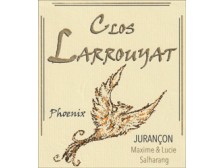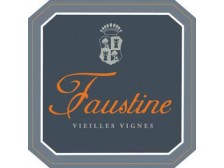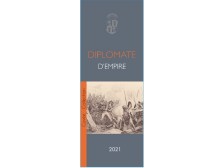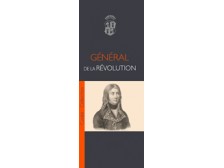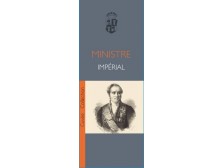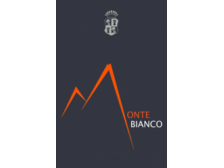Catalog
Created in 2009 to replace the “Vin de Table” appellation, the “Vin de France” appellation was intended to classify all entry-level industrial wine productions made from French grapes.
It is interesting to note that today, this rather modest designation is gradually becoming the preserve of great wines from renowned producers, whether for reasons of administrative simplification or entrepreneurial freedom (unrestricted choice of grape varieties, cultivation techniques, winemaking practices, etc.).
This is evidenced by Château Lafleur's decision to abandon the Pomerol appellation and label all of its production as ‘Vin de France’ from the 2025 vintage onwards.
-
Although produced in Lamarque in the heart of Haut-Médoc, this is the most original dry white wine in the Gironde, a blend of gros manseng (as in Jurançon), sauvignon gris (superior to the more common sauvignon blanc), savagnin (as in Jura) and mondeuse blanche (as in Savoie). All this gives a dry white wine with golden reflections, powerful, sapy, fruity, complex and elegant. A special wine!
More- To keep or to drink:
- Ready to drink
- Apogée:
- 2025-2031
-
With their Haut-Médoc, Laurence Alias and Pascale Choime, respectively engineer and oenologist, also have a half-hectare in Margaux (Cantenac) pampered like a vegetable garden. It gathers 6 Bordeaux grape varieties (with Petit Verdot, Carménère and Malbec), some of which are more than a century old. Biodynamic cultivation, nothing else in the cellar but the grapes and a little sulfur, aging in 400 liter barrels, everything is done to stay as close as possible to the most delicate and crisp fruit.
Moineaux is the 2018 vintage of the usual cuvée produced in Margaux. Airy and subtly fruity (raspberry juice), it did not receive the approval of the appellation because it is considered atypical: it is consequently labeled as Vin de France.
More- To keep or to drink:
- Ready to drink
- Apogée:
- 2025-2036
- Organic certification:
- 2012
-
It is François Chidaine who, since 1989, has sounded the awakening of Touraine wines and given the white Chenin its letters of nobility. Biodynamic since 1999, his wines show a crystalline purity and a vibrancy that are a reference... with prices that are just as exemplary.
Rated three stars in the Revue du Vin de France guide.
The Vouvray wines of Domaine Chidaine (Les Argiles, Baudoin) are hidden under the appellation Vin de France. They can no longer claim the Vouvray appellation since 2011 because they are vinified at the estate in Montlouis-sur-Loire (i.e. on the other side of the bridge over the Loire) and not in the commune of Vouvray. The INAO has reasons that reason does not know!More- To keep or to drink:
- Ready to drink
- Apogée:
- 2025-2032
- Organic certification:
- 1992
-
It is François Chidaine who, since 1989, has sounded the awakening of Touraine wines and given the white Chenin its letters of nobility. Biodynamic since 1999, his wines show a crystalline purity and a vibrancy that are a reference... with prices that are just as exemplary.
Rated three stars in the Revue du Vin de France guide.
The Vouvray wines of Domaine Chidaine (Les Argiles, Baudoin) are hidden under the appellation Vin de France. They can no longer claim the Vouvray appellation since 2011 because they are vinified at the estate in Montlouis-sur-Loire (i.e. on the other side of the bridge over the Loire) and not in the commune of Vouvray. The INAO has reasons that reason does not know!More- To keep or to drink:
- Wait 1 to 2 years
- Apogée:
- 2027-2037
- Organic certification:
- 1992
-
With 7 hectares spread over 28 plots held like gardens, Guillaume Sorbe is an outstanding goldsmith. On its two appellations Quincy and Reuilly in the Cher valley, it chisels fantastic wines, white (sauvignon) and red (pinot noir), esthetic wines that are both tasty and mineral, fat and tense. His excellence is already recognized: "Winemaker of the year 2018" for the Revue du Vin de France, and cited in the Top 10 of the best producers in the Bettane&Desseauve 2019 guide.
In order to avoid the regulatory constraints of the INAO, Guillaume Sorbe now prefers to label his wines under the generic name "Vin de France". This does not change anything about their origin or their quality. The comment of the Revue du Vin France is eloquent: "No wine in the sector reaches this level of precision and substance. They are among the most ambitious whites in the Loire Valley."
Argos : Sauvignon on alluvial soil, tonic, fresh and crisp wine.
Domaine rated two stars in the Revue du Vin de France annual guide.
More- To keep or to drink:
- Ready to drink
- Apogée:
- 2022-2030
-
With 7 hectares spread over 28 plots held like gardens, Guillaume Sorbe is an outstanding goldsmith. On its two appellations Quincy and Reuilly in the Cher valley, it chisels fantastic wines, white (sauvignon) and red (pinot noir), esthetic wines that are both tasty and mineral, fat and tense. His excellence is already recognized: "Winemaker of the year 2018" for the Revue du Vin de France, and cited in the Top 10 of the best producers in the Bettane&Desseauve 2019 guide.
In order to avoid the regulatory constraints of the INAO, Guillaume Sorbe now prefers to label his wines under the generic name "Vin de France". This does not change anything about their origin or their quality. The comment of the Revue du Vin France is eloquent: "No wine in the sector reaches this level of precision and substance. They are among the most ambitious whites in the Loire Valley."
Argos : Sauvignon on alluvial soil, tonic, fresh and crisp wine.
Domaine rated two stars in the Revue du Vin de France annual guide.
More- To keep or to drink:
- Ready to drink
- Apogée:
- 2022-2030
-
With 7 hectares spread over 28 plots held like gardens, Guillaume Sorbe is an outstanding goldsmith. On its two appellations Quincy and Reuilly in the Cher valley, it chisels fantastic wines, white (sauvignon) and red (pinot noir), esthetic wines that are both tasty and mineral, fat and tense. His excellence is already recognized: "Winemaker of the year 2018" for the Revue du Vin de France, and cited in the Top 10 of the best producers in the Bettane&Desseauve 2019 guide.
In order to avoid the regulatory constraints of the INAO, Guillaume Sorbe now prefers to label his wines under the generic name "Vin de France". This does not change anything about their origin or their quality. The comment of the Revue du Vin France is eloquent: "No wine in the sector reaches this level of precision and substance. They are among the most ambitious whites in the Loire Valley."
Argos : Sauvignon on alluvial soil, tonic, fresh and crisp wine.
Domaine rated two stars in the Revue du Vin de France annual guide.
More- To keep or to drink:
- Ready to drink
- Apogée:
- 2022-2030
-
With 7 hectares spread over 28 plots held like gardens, Guillaume Sorbe is an outstanding goldsmith. On its two appellations Quincy and Reuilly in the Cher valley, it chisels fantastic wines, white (sauvignon) and red (pinot noir), esthetic wines that are both tasty and mineral, fat and tense. His excellence is already recognized: "Winemaker of the year 2018" for the Revue du Vin de France, and cited in the Top 10 of the best producers in the Bettane&Desseauve 2019 guide.
In order to avoid the regulatory constraints of the INAO, Guillaume Sorbe now prefers to label his wines under the generic name "Vin de France". This does not change anything about their origin or their quality. The comment of the Revue du Vin France is eloquent: "No wine in the sector reaches this level of precision and substance. They are among the most ambitious whites in the Loire Valley."
Orphée : Sauvignon on clay-limestone soil, more richness, fat and amplitude than Quincy.
Domaine rated two stars in the Revue du Vin de France annual guide.
The 2020 vintage in the press:
La Revue du Vin de France (Guide 2025): 93/100 Coup de ♥ “We find more fullness, chewiness, relief of flavors in Orphée (Reuilly) whose tasty, serene balance promises a quiet evolution in the coming years.”
More- To keep or to drink:
- Ready to drink
- Apogée:
- 2024-2032
-
With 7 hectares spread over 28 plots held like gardens, Guillaume Sorbe is an outstanding goldsmith. On its two appellations Quincy and Reuilly in the Cher valley, it chisels fantastic wines, white (sauvignon) and red (pinot noir), esthetic wines that are both tasty and mineral, fat and tense. His excellence is already recognized: "Winemaker of the year 2018" for the Revue du Vin de France, and cited in the Top 10 of the best producers in the Bettane&Desseauve 2019 guide.
In order to avoid the regulatory constraints of the INAO, Guillaume Sorbe now prefers to label his wines under the generic name "Vin de France". This does not change anything about their origin or their quality. The comment of the Revue du Vin France is eloquent: "No wine in the sector reaches this level of precision and substance. They are among the most ambitious whites in the Loire Valley."
Orphée : Sauvignon on clay-limestone soil, more richness, fat and amplitude than Quincy.
Domaine rated two stars in the Revue du Vin de France annual guide.
More- To keep or to drink:
- Ready to drink
- Apogée:
- 2024-2032
-
With 7 hectares spread over 28 plots held like gardens, Guillaume Sorbe is an outstanding goldsmith. On its two appellations Quincy and Reuilly in the Cher valley, it chisels fantastic wines, white (sauvignon) and red (pinot noir), esthetic wines that are both tasty and mineral, fat and tense. His excellence is already recognized: "Winemaker of the year 2018" for the Revue du Vin de France, and cited in the Top 10 of the best producers in the Bettane&Desseauve 2019 guide.
In order to avoid the regulatory constraints of the INAO, Guillaume Sorbe now prefers to label his wines under the generic name "Vin de France". This does not change anything about their origin or their quality. The comment of the Revue du Vin France is eloquent: "No wine in the sector reaches this level of precision and substance. They are among the most ambitious whites in the Loire Valley."
Toison d'or : 100% pinot gris vinified in white, as in Alsace, offering a full, velvety and delicately spiced wine.
Domaine rated two stars in the Revue du Vin de France annual guide.
More- To keep or to drink:
- Ready to drink
- Apogée:
- 2023-2032
-
With 7 hectares spread over 28 plots held like gardens, Guillaume Sorbe is an outstanding goldsmith. On its two appellations Quincy and Reuilly in the Cher valley, it chisels fantastic wines, white (sauvignon) and red (pinot noir), esthetic wines that are both tasty and mineral, fat and tense. His excellence is already recognized: "Winemaker of the year 2018" for the Revue du Vin de France, and cited in the Top 10 of the best producers in the Bettane&Desseauve 2019 guide.
In order to avoid the regulatory constraints of the INAO, Guillaume Sorbe now prefers to label his wines under the generic name "Vin de France". This does not change anything about their origin or their quality. The comment of the Revue du Vin France is eloquent: "No wine in the sector reaches this level of precision and substance. They are among the most ambitious whites in the Loire Valley."
Toison d'or : 100% pinot gris vinified in white, as in Alsace, offering a full, velvety and delicately spiced wine.
Domaine rated two stars in the Revue du Vin de France annual guide.
More- To keep or to drink:
- Ready to drink
- Apogée:
- 2023-2032
-
A new generation of winegrowers is waking Cahors up. Rustic wines with coarse tannins are a thing of the past. Make way for digestible, tasty, fruity and velvety malbecs. The duo Matthieu Cosse (the oenologist) / Catherine Maisonneuve (the winegrower) is part of this new Cadurian elite, with a magnificent range of wines where purity, precision and elegance prevail. "Transcending the boundaries of its appellation, the estate is one of the best in France" for Mr. Bettane.
Rated two stars in the Revue du Vin de France guide.
Sidérolithe is the 100% cabernet franc counterpart (on iron clay) of their other cuvée Marguerite which is 100% malbec. Its aromas of raspberry and violet and its velvety texture are immediately reminiscent of Pomerol.
The 2021 vintage in the reviews:
La Revue du Vin de France (December 2024): 94/100 “Catherine Maisonneuve and Matthieu Cosse were the first to reveal the potential of Cabernet Franc planted in the Quercy region on a pocket of clay. The great forgotten grape of Cahors, it displays here the austerity of the tannins that signal the cold 2021 vintage, but above all the aristocracy of this grape whose tasty fruit is revealed on a texture that suggests a radiant evolution held by the imprint of its terroir.”
More- To keep or to drink:
- Wait 1 to 2 years
- Apogée:
- 2024-2035
-
A new generation of winegrowers is waking Cahors up. Rustic wines with coarse tannins are a thing of the past. Make way for digestible, tasty, fruity and velvety malbecs. The duo Matthieu Cosse (the oenologist) / Catherine Maisonneuve (the winegrower) is part of this new Cadurian elite, with a magnificent range of wines where purity, precision and elegance prevail. "Transcending the boundaries of its appellation, the estate is one of the best in France" for Mr. Bettane.
Rated two stars in the Revue du Vin de France guide.
Sidérolithe is the 100% cabernet franc counterpart (on iron clay) of their other cuvée Marguerite which is 100% malbec. Its aromas of raspberry and violet and its velvety texture are immediately reminiscent of Pomerol.
The 2020 vintage in the reviews:
La Revue du Vin de France (Guide 2026) : 93/100
More- To keep or to drink:
- Wait 3 to 5 years
- Apogée:
- 2028-2042
-
After a degree in chemistry, Maxime Salharang chose, somewhat by chance, to go into oenology. He trained in several great Bordeaux châteaux (Smith Haut-Lafitte, Carbonnieux) and was introduced to biodynamics at the Domaine de Souch in Jurançon, before going into his own vineyards at Clos Larrouyat (3 ha) with his wife Lucie. The full eastern exposure and the unique specificity of the subsoil (clay and pebbles rolled on a strip of Trias) give his wines a delicate freshness, intensity, minerality and length rare for the appellation. The work and thoughtful application of the Salharang couple convince us that Clos Larrouyat is a future great of the appellation.
Rated one star in the Revue du Vin de France guide (from 2026 onwards).
The sweet "Phoenix", a 100% small manseng, is cloudy because of its low sugar content and its freshness. The aromatic intensity (verbena, pineapple, tangerine, citrus zest) of petit manseng is expressed without heaviness thanks to its tractable vivacity and its measured liquor.
The 2024 vintage in the press:
La Revue du Vin de France (Guide 2026): 90/100 "The subtle residual sugar in the Phoenix cuvée tempers this sharpness somewhat."
More- To keep or to drink:
- Wait 3 to 5 years
- Apogée:
- 2028-2038
- Organic certification:
- 2015
-
With a priceless ampelographic collection built up by his father Antoine in the 1960s, Jean-Charles Abbatucci is the guardian of the endemic grape varieties and wine-making traditions of Corsica. This variety of grapes (with melodious names: Carcajolo Bianco, Paga Debbiti, Rossola Brandinca...) coupled with a sumptuous terroir of 14 ha full hillside south of Ajaccio and a demanding viticulture (biodynamic since 2000) explains the special place of Domaine Abbatucci within the Corsican producers. It is with the white wines, certainly among the most beautiful of the Mediterranean basin, that this domain has built up an unequalled reputation.
The first cuvée Faustine, 100% vermentino, is a direct entry into the Abbatucci universe: floral (aniseed) and delicately apricot on the nose, supple (without any heaviness) and elegant on the palate, with a fine bitterness on the finish.
Rated three stars in the Revue du Vin de France's annual guide.
The 2024 vintage in the press:
La Revue du Vin de France (Guide 2026): 91/100 “The Vermentinu, with its refined, aniseed profile, gains breadth with time.”
More- To keep or to drink:
- Ready to drink
- Apogée:
- 2023-2028
-
With a priceless ampelographic collection built up by his father Antoine in the 1960s, Jean-Charles Abbatucci is the guardian of the endemic grape varieties and wine-making traditions of Corsica. This variety of grapes (with melodious names: Carcajolo Bianco, Paga Debbiti, Rossola Brandinca...) coupled with a sumptuous terroir of 14 ha full hillside south of Ajaccio and a demanding viticulture (biodynamic since 2000) explains the special place of Domaine Abbatucci within the Corsican producers. It is with the white wines, certainly among the most beautiful of the Mediterranean basin, that this domain has built up an unequalled reputation.
The first cuvée Faustine, 100% vermentino, is a direct entry into the Abbatucci universe: floral (aniseed) and delicately apricot on the nose, supple (without any heaviness) and elegant on the palate, with a fine bitterness on the finish.
Rated three stars in the Revue du Vin de France's annual guide.
The 2023 vintage in the press:
La Revue du Vin de France (Guide 2025): 92/100 “Svelte and uncluttered, the white is dynamic and mineral.”
More- To keep or to drink:
- Ready to drink
- Apogée:
- 2023-2028
-
With a priceless ampelographic collection built up by his father Antoine in the 1960s, Jean-Charles Abbatucci is the guardian of the endemic grape varieties and wine-making traditions of Corsica. This variety of grapes (with melodious names: Carcajolo Bianco, Paga Debbiti, Rossola Brandinca...) coupled with a sumptuous terroir of 14 ha full hillside south of Ajaccio and a demanding viticulture (biodynamic since 2000) explains the special place of Domaine Abbatucci within the Corsican producers. It is with the white wines, certainly among the most beautiful of the Mediterranean basin, that this domain has built up an unequalled reputation.
The first cuvée Faustine, 100% vermentino, is a direct entry into the Abbatucci universe: floral (aniseed) and delicately apricot on the nose, supple (without any heaviness) and elegant on the palate, with a fine bitterness on the finish.
Rated three stars in the Revue du Vin de France's annual guide.
Rated 92/100 by La Revue du Vin de France "This cuvée was made in 1998 when my daughter Faustine was born. It is a 100% vermentino planted on granite arena. A brilliantly coloured wine with lots of freshness and minerality. Ideal with fish or white meats." (January 2024)
More- To keep or to drink:
- Ready to drink
- Apogée:
- 2023-2028
-
With a priceless ampelographic collection built up by his father Antoine in the 1960s, Jean-Charles Abbatucci is the guardian of the endemic grape varieties and wine-making traditions of Corsica. This variety of grapes (with melodious names: Carcajolo Bianco, Paga Debbiti, Rossola Brandinca...) coupled with a sumptuous terroir of 14 ha full hillside south of Ajaccio and a demanding viticulture (biodynamic since 2000) explains the special place of Domaine Abbatucci within the Corsican producers. It is with the white wines, certainly among the most beautiful of the Mediterranean basin, that this domain has built up an unequalled reputation.
Rated three stars in the Revue du Vin de France guide.
One of the two great vintages of the domain, dominated by vermentino and supplemented by 10 autochthonous grape varieties in varying proportions, is an exceptional wine with good ageing potential (10 years and more): the Diplomate is full-bodied, sapid and tasty but restrained. For this wine the whole aromatic palette of the Corsican scrubland: citrus fruits (citron, kumquat...), verbena, thyme, rosemary, fennel, anise, wild mint, jasmine, pine nuts, dry stones...
More- To keep or to drink:
- Wait 1 to 2 years
- Apogée:
- 2026-2036
-
With a priceless ampelographic collection built up by his father Antoine in the 1960s, Jean-Charles Abbatucci is the guardian of the endemic grape varieties and wine-making traditions of Corsica. This variety of grapes (with melodious names: Carcajolo Bianco, Paga Debbiti, Rossola Brandinca...) coupled with a sumptuous terroir of 14 ha full hillside south of Ajaccio and a demanding viticulture (biodynamic since 2000) explains the special place of Domaine Abbatucci within the Corsican producers. It is with the white wines, certainly among the most beautiful of the Mediterranean basin, that this domain has built up an unequalled reputation.
Rated three stars in the Revue du Vin de France guide.
One of the two great vintages of the domain, dominated by vermentino and supplemented by 10 autochthonous grape varieties in varying proportions, is an exceptional wine with good ageing potential (10 years and more): the Diplomate is full-bodied, sapid and tasty but restrained. For this wine the whole aromatic palette of the Corsican scrubland: citrus fruits (citron, kumquat...), verbena, thyme, rosemary, fennel, anise, wild mint, jasmine, pine nuts, dry stones...
More- To keep or to drink:
- Wait 1 to 2 years
- Apogée:
- 2026-2036
-
With a priceless ampelographic collection built up by his father Antoine in the 1960s, Jean-Charles Abbatucci is the guardian of the endemic grape varieties and wine-making traditions of Corsica. This variety of grapes (with melodious names: Carcajolo Bianco, Paga Debbiti, Rossola Brandinca...) coupled with a sumptuous terroir of 14 ha full hillside south of Ajaccio and a demanding viticulture (biodynamic since 2000) explains the special place of Domaine Abbatucci within the Corsican producers. It is with the white wines, certainly among the most beautiful of the Mediterranean basin, that this domain has built up an unequalled reputation.
Rated three stars in the Revue du Vin de France guide.
One of the two great vintages of the domain, dominated by vermentino and supplemented by 10 autochthonous grape varieties in varying proportions, is an exceptional wine with good ageing potential (10 years and more): the Diplomate is full-bodied, sapid and tasty but restrained. For this wine the whole aromatic palette of the Corsican scrubland: citrus fruits (citron, kumquat...), verbena, thyme, rosemary, fennel, anise, wild mint, jasmine, pine nuts, dry stones...
The 2021 vintage is rated 93-94/100 by the Revue du Vin de France « Des parfums accueillants et frais de fenouil, de cédrat forment un ensemble cristallin, pur et frais, noblement boisé. La bouche offre à la fois une trame mûre et tonique, sans oublier une belle énergie et salinité. »
More- To keep or to drink:
- Wait 1 to 2 years
- Apogée:
- 2026-2036
-
With a priceless ampelographic collection built up by his father Antoine in the 1960s, Jean-Charles Abbatucci is the guardian of the endemic grape varieties and wine-making traditions of Corsica. This variety of grapes (with melodious names: Carcajolo Bianco, Paga Debbiti, Rossola Brandinca...) coupled with a sumptuous terroir of 14 ha full hillside south of Ajaccio and a demanding viticulture (biodynamic since 2000) explains the special place of Domaine Abbatucci within the Corsican producers. It is with the white wines, certainly among the most beautiful of the Mediterranean basin, that this domain has built up an unequalled reputation.
Rated three stars in the Revue du Vin de France guide.
One of the two great vintages of the estate, with a dominant vermentino complemented by 10 autochthonous grape varieties in varying proportions, is an exceptional wine with good aging capacities (10 years and more): the General is more lively, its tension going hand in hand with its sparkling length. For this wine the whole aromatic palette of the Corsican scrubland: citrus fruits (citron, kumquat...), verbena, thyme, rosemary, fennel, anise, wild mint, jasmine, pine nuts, dry stones...
The 2023 vintage in the press:
La Revue du Vin de France (Guide 2026): 94/100 Coup de ♥ "Général de la Révolution reveals a complex, balanced, perfectly matured white wine, aged on its lees for nine months, a mosaic of six grape varieties."
Bettane + Desseauve (Guide 2026) : 94/100
More- To keep or to drink:
- Wait 3 to 5 years
- Apogée:
- 2025-2035
-
With a priceless ampelographic collection built up by his father Antoine in the 1960s, Jean-Charles Abbatucci is the guardian of the endemic grape varieties and wine-making traditions of Corsica. This variety of grapes (with melodious names: Carcajolo Bianco, Paga Debbiti, Rossola Brandinca...) coupled with a sumptuous terroir of 14 ha full hillside south of Ajaccio and a demanding viticulture (biodynamic since 2000) explains the special place of Domaine Abbatucci within the Corsican producers. It is with the white wines, certainly among the most beautiful of the Mediterranean basin, that this domain has built up an unequalled reputation.
Rated three stars in the Revue du Vin de France guide.
Light ruby in color, airy and delicate on the palate, superlative freshness, silky tannins: all the magic of high-altitude sciaccarellu (with a few vines of old autochthonous varieties) is expressed in the Ministre Impérial cuvée, grown on granite soil and picked at optimum ripeness, with an almost Burgundian profile. A great wine!
The 2023 vintage in the press:
La Revue du Vin de France (Guide 2026) : 93/100
More- To keep or to drink:
- Wait 3 to 5 years
- Apogée:
- 2029-2042
-
With a priceless ampelographic collection built up by his father Antoine in the 1960s, Jean-Charles Abbatucci is the guardian of the endemic grape varieties and wine-making traditions of Corsica. This variety of grapes (with melodious names: Carcajolo Bianco, Paga Debbiti, Rossola Brandinca...) coupled with a sumptuous terroir of 14 ha full hillside south of Ajaccio and a demanding viticulture (biodynamic since 2000) explains the special place of Domaine Abbatucci within the Corsican producers. It is with the white wines, certainly among the most beautiful of the Mediterranean basin, that this domain has built up an unequalled reputation.
Rated three stars in the Revue du Vin de France guide.
Light ruby in color, airy and delicate on the palate, superlative freshness, silky tannins: all the magic of high-altitude sciaccarellu (with a few vines of old autochthonous varieties) is expressed in the Ministre Impérial cuvée, grown on granite soil and picked at optimum ripeness, with an almost Burgundian profile. A great wine!
More- To keep or to drink:
- Wait 1 to 2 years
- Apogée:
- 2027-2038
-
With a priceless ampelographic collection built up by his father Antoine in the 1960s, Jean-Charles Abbatucci is the guardian of the endemic grape varieties and wine-making traditions of Corsica. This variety of grapes (with melodious names: Carcajolo Bianco, Paga Debbiti, Rossola Brandinca...) coupled with a sumptuous terroir of 14 ha full hillside south of Ajaccio and a demanding viticulture (biodynamic since 2000) explains the special place of Domaine Abbatucci within the Corsican producers. It is with the white wines, certainly among the most beautiful of the Mediterranean basin, that this domain has built up an unequalled reputation.
Rated three stars in the Revue du Vin de France guide.
Monte Bianco, his greatest red wine, with its light ruby colour, its airy and delicate palate, its superlative freshness and silky tannins, offers all the magic of high altitude sciaccarellu on granitic soil and harvested at optimal maturity. A really great wine!
The 2023 vintage in the press:
La Revue du Vin de France (Guide 2026): 93/100 "Monte Bianco, although warm, seduces with its energy and the finesse of the sciaccarellu."
Bettane + Desseauve (Guide 2026) : 96/100
More- To keep or to drink:
- Wait 1 to 2 years
- Apogée:
- 2027-2038


